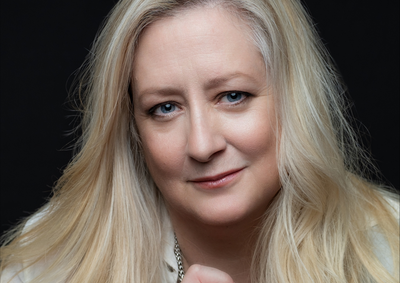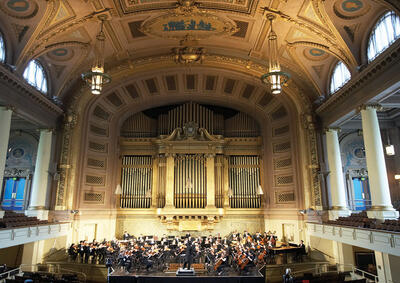Why Aren't Composers Writing More Symphonies Today?
Capital Public Radio
By Derek Bermel '89BA
 At 8 years old, I scrawled my first and last Symphonies — nos. 1, 2, and 3 — on ruled notebook paper. They were short duets for clarinet and trumpet for myself and my brother to play. Why did I call them symphonies? I can't remember, but I suspect that it was a desire to tie these efforts — and me, by extension — to a grand and venerable tradition.
At 8 years old, I scrawled my first and last Symphonies — nos. 1, 2, and 3 — on ruled notebook paper. They were short duets for clarinet and trumpet for myself and my brother to play. Why did I call them symphonies? I can't remember, but I suspect that it was a desire to tie these efforts — and me, by extension — to a grand and venerable tradition.
Many of America's most eminent living composers — like John Corigliano, William Bolcom, Ollie Wilson, Charles Wuorinen, Philip Glass, John Harbison, Ellen Taaffe Zwilich, John Adams, Christopher Rouse, Steven Stucky and Stephen Hartke — have written at least one symphony, and a younger generation — including Aaron Jay Kernis, Kamran Ince, Lowell Liebermann, Christopher Theofanidis, Kevin Puts and Huang Ruo — demonstrate that there is more depth and beauty to be mined in this time-honored tradition. But having encountered thousands of submissions to the American Composers Orchestra over the past several seasons, I've noticed a dearth of works with "Symphony" in the title. At the ACO, where I am the artistic director, the 2007 strategic plan mandated a focus on 'emerging' composers, and programming has reflected that change. That's yielded a dramatic drop-off in the number of symphonies programmed in recent years. I asked several younger composers about this phenomenon and was intrigued by the thoughtful and thought-provoking answers they offered.
Berkeley native Gabriela Lena Frank, whose Manchay Tiempo will be performed by ACO this season, affirms an allergy to the title, but not necessarily to the form. "Maybe I'm rebelling against the reverential stupor that often greets the word 'symphony,'" she wrote to me. "When I listen to the symphonies of Mahler and Beethoven, I often call them something else in my head, so that they are actually approachable, even achievable." Virginian-turned-San Franciscan Mason Bates, whose Omnivorous Furniture was performed by ACO in 2006, wrote: "I avoid the old-school term because it misses a creative opportunity. Titles for me aren't just a setting of the stage; they're the first and most important part of a dramatic conceit." Chicago-based Anthony Cheung, whose Symphony was read by ACO in 2001, now avoids the term and is more comfortable with the more vague description symphonic. "The [noun] carries the huge weight of a glorious but rather specific tradition, and the [adjective] signifies any combination of length, instrumentation, and desire to express and communicate on a grand scale."





